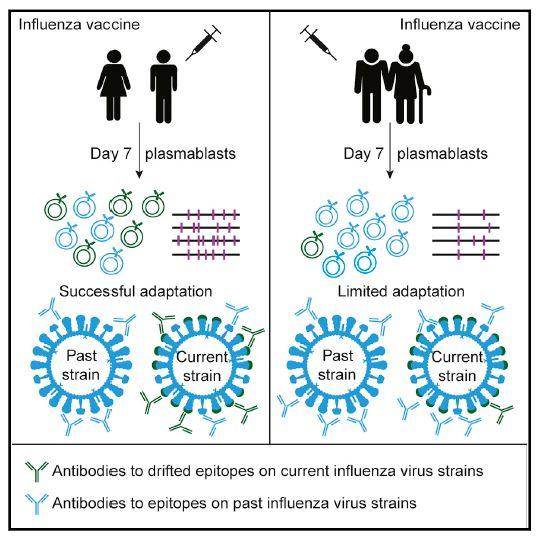
Credit: Henry et al./Cell Host & Microbe
The influenza vaccine may be less effective in the elderly because their B cells are less capable of producing antibodies that can adapt to protect against new viral strains, researchers report February 19 in the journal Cell Host & Microbe. With age, B cells and the antibodies they secrete acquire fewer mutations that would provide flexible protection against the ever-changing flu virus.
“The major implication is that when a newly circulating influenza virus infects elderly individuals, they don’t have quite the right tool to fight it because their antibodies are not as protective,” says senior study author Patrick Wilson of the University of Chicago. “Our findings could be used by the vaccine community to make better vaccines and improve protection of the elderly population.”
The detrimental effect of aging on the immune system is thought to be a major cause of illness and death in elderly adults by increasing susceptibility to bacterial, fungal, and viral infections. The great majority of influenza deaths occur within populations older than 65 years, and aged individuals have a significantly reduced antibody response to influenza vaccination. As a result, influenza is a leading cause of death in the elderly, and the vaccine protects only a fraction of this population.
To understand the underlying mechanisms, Wilson and his team compared how B cells and antibodies from elderly and younger adults respond to vaccination with different flu strains. While B cells from younger subjects showed a continued recent accumulation of mutations, the elderly appeared to have an essentially fixed B-cell repertoire, lacking recent adaptations that would allow the evolution of B cells to divergent influenza virus strains.
Moreover, antibodies from the elderly are less potent and less capable of protecting against the flu virus. The antibodies of elderly subjects target only conserved proteins and structures of the influenza virus, with fewer mutations that would enable effective responses against evolving viral strains. By contrast, antibodies from younger individuals are better able to recognize recently mutated molecules on the flu virus.
The findings suggest that antibodies from aged individuals arise from cross-reactive memory B cells generated early in life, with reduced adaptation to recent influenza virus strains. For example, 47% of antibodies generated from the elderly individuals bound to six or more strains of the flu virus compared to only 12% for the young adults. In addition, antibodies from the elderly individuals had higher affinity to historical strains that were circulating during their childhood and lower affinity to more contemporary strains.
Despite these observations, vaccination remains the best way to protect elderly individuals from influenza virus infection. “We are not saying that people shouldn’t be vaccinated or that the current vaccines are useless for elderly individuals,” says first author Carole Henry of the University of Chicago.
Currently, the researchers are working to understand the underlying biological basis for their observations. From a clinical standpoint, the findings suggest that vaccines driving protective mutations in B cells should be a priority to improve influenza immunity in the elderly. “More recent vaccines developed especially for the elderly population are now on the market and could help induce more protective antibodies,” Wilson says. “The next step will be to evaluate antibody adaptability in elderly individuals immunized with these vaccines.”
###
This study was supported by the National Institute of Allergy and Infectious Disease; the National Institutes of Health, the NIAID Centers of Excellence for Influenza Research and Surveillance, the James S. McDonnell Complex Systems Scholar Award, the NIA, and the Duke Pepper Older Americans Independence Center. The authors declare no competing interest.
Cell Host & Microbe, Henry et al.: “Influenza virus vaccination elicits poorly adapted B cell responses in elderly individuals” http://www.cell.com/cell-host-microbe/fulltext/S1931-3128(19)30039-3
Cell Host & Microbe (@cellhostmicrobe), published by Cell Press, is a monthly journal that publishes novel findings and translational studies related to microbes (which include bacteria, fungi, parasites, and viruses). The unifying theme is the integrated study of microbes in conjunction and communication with each other, their host, and the cellular environment they inhabit. Visit: http://www.
Media Contact
Carly Britton
@CellPressNews
617-417-7053
Related Journal Article
http://dx.




